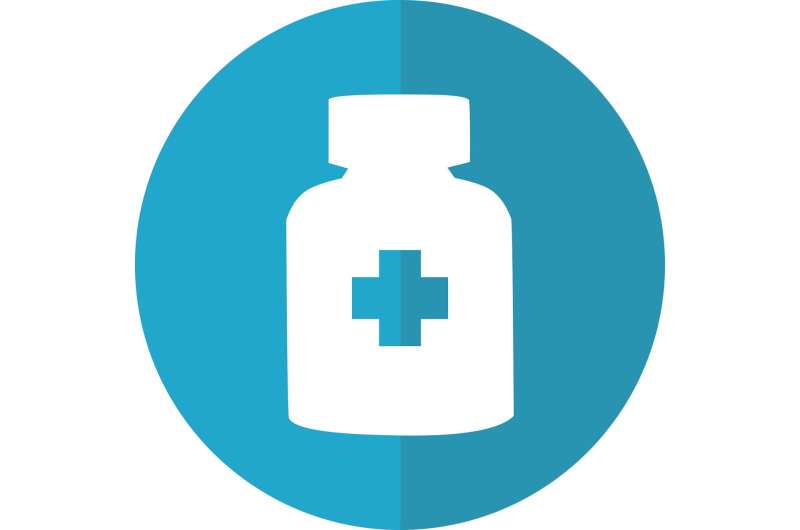This article has been reviewed according to Science X's editorial process and policies. Editors have highlighted the following attributes while ensuring the content's credibility:
fact-checked
trusted source
proofread
Dual-antiplatelet therapy should remain standard strategy after stent implantation, research finds

Prasugrel monotherapy after percutaneous coronary intervention (PCI) with drug-eluting stents is not superior to dual-antiplatelet therapy (DAPT) for major bleeding but is non-inferior for cardiovascular events in patients with acute coronary syndrome (ACS) or high bleeding risk (HBR), according to late breaking research presented in a Hot Line session August 26 at ESC Congress 2023.
Very short (one to three months) durations of DAPT followed by P2Y12 inhibitor monotherapy has been shown to reduce bleeding events without increasing cardiovascular events compared with standard durations of DAPT after PCI using drug-eluting stents. However, the incidence of major bleeding events within the 1-month mandatory DAPT period after PCI remains high in real clinical practice, particularly in patients with ACS or HBR.
In single-arm studies, aspirin-free prasugrel or ticagrelor monotherapy following successful new-generation drug-eluting stent implantation was not associated with any stent thrombosis in selected low-risk patients with or without ACS. Removing aspirin from the DAPT regimen might reduce bleeding events early after PCI without compromising the risk of cardiovascular events. However, the efficacy and safety of this strategy has not been proven in randomized trials.
ESC guidelines recommend six months of DAPT in HBR patients with ACS and 12 months of DAPT in non-HBR patients with ACS after PCI. In patients with non-ACS, one to three months of DAPT is recommended in HBR patients after PCI.
STOPDAPT-3 investigated the efficacy and safety of aspirin-free prasugrel monotherapy compared with 1-month DAPT with aspirin and prasugrel in patients with ACS or HBR undergoing PCI with cobalt-chromium everolimus-eluting stents. From January 2021 to April 2023, the study enrolled 6,002 patients with ACS or HBR from 72 centers in Japan. Just before PCI, patients were randomized in a 1:1 fashion to prasugrel (3.75 mg/day) monotherapy or to DAPT with aspirin (81–100 mg/day) and prasugrel after a loading dose of prasugrel 20 mg in both groups.
There were two primary endpoints: 1) major bleeding events (defined as Bleeding Academic Research Consortium [BARC] type 3 or 5) at one month for superiority; and 2) cardiovascular events (a composite of cardiovascular death, myocardial infarction, definite stent thrombosis, or stroke) at one month for non-inferiority. The major secondary endpoint was a composite of the co-primary bleeding and cardiovascular endpoints (cardiovascular death, myocardial infarction, definite stent thrombosis, stroke, or major bleeding) at one month representing net clinical benefit.
The full analysis set population consisted of 5,966 patients (no-aspirin group: 2,984 patients; DAPT group: 2,982 patients). The average age was 71.6 years and 23.4% were women. At one month, the no-aspirin strategy was not superior to DAPT for the co-primary bleeding endpoint (4.47% vs. 4.71%; hazard ratio [HR], 0.95; 95% confidence interval [CI], 0.75-1.20; p for superiority=0.66). The no-aspirin strategy was non-inferior to DAPT with a relative 50% margin for the co-primary cardiovascular endpoint (4.12% vs. 3.69%; HR, 1.12; 95% CI, 0.87-1.45; p for non-inferiority=0.01).
There was no between-group difference in the incidence of all-cause death (2.28% vs. 2.11% in the no-aspirin and DAPT groups, respectively). The major secondary endpoint occurred in 7.14% patients in the no-aspirin group and 7.38% patients in the DAPT group, with no between-group difference, indicating a similar effect on net clinical benefit for both groups.
There was an excess of any coronary revascularization (1.15% vs. 0.57%) and definite or probable stent thrombosis (0.71% vs. 0.44%) in the no-aspirin group compared with the DAPT group, while definite stent thrombosis was not different between the two groups (0.47% vs. 0.37%). In a subgroup analysis stratified by ACS and non-ACS, the excess risk of cardiovascular events in the no-aspirin group compared with the DAPT group was seen in patients with ACS, but not in those without ACS.
Study author Dr. Masahiro Natsuaki of Saga University, Japan said, "The aspirin-free strategy compared with the DAPT strategy failed to reduce major bleeding within one month after PCI, but it was non-inferior for the co-primary cardiovascular endpoint with a relative 50% margin. Aspirin used for a limited period of one month after PCI as a component of DAPT might have exerted a protective effect on vulnerable coronary lesions, particularly in patients with ACS, without a large increase in major bleeding. DAPT should remain the standard strategy for PCI even in the new-generation drug-eluting stent era."



















